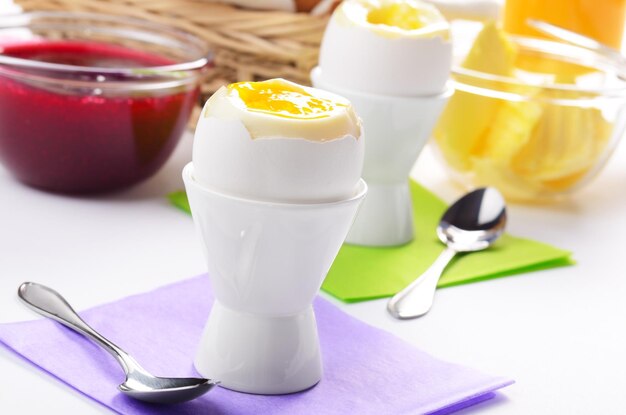How Long Are Boiled Eggs Good for in the Refrigerator?
Have you ever boiled a batch of eggs, planning to enjoy them throughout the week, only to find yourself wondering if they're still safe to eat a few days later? Boiled eggs are a convenient and nutritious snack, but like all foods, they have a limited shelf life. This comprehensive guide will explore everything you need to know about storing boiled eggs in the refrigerator, including how long they stay fresh, tips for proper storage, and ways to tell if your eggs have gone bad. Plus, we'll dive into some handy cooking and peeling tips that make handling boiled eggs a breeze.
🥚 Understanding the Basics of Egg Storage
Eggs are a staple in many households due to their versatility and nutritional benefits. However, understanding how to store them effectively is crucial to prevent foodborne illnesses and ensure that they remain safe and tasty.
Why Store Boiled Eggs in the Refrigerator?
Refrigeration is key when it comes to prolonging the freshness and safety of boiled eggs. Once eggs are boiled, they lose the protective coating that helps keep bacteria out, which means they become more susceptible to spoilage. Storing boiled eggs in the refrigerator helps slow bacterial growth, keeping them fresh for a longer period.
How Long Do Boiled Eggs Last in the Refrigerator?
Boiled eggs stored in the refrigerator typically last for about one week. However, this can vary slightly depending on a few factors, such as whether the eggs are peeled or still in their shells.
Peeled vs. Unpeeled Boiled Eggs
Unpeeled Boiled Eggs: These tend to last a little longer because the shell acts as a protective barrier against bacteria and odors from other foods. In this state, boiled eggs can maintain their quality for up to seven days.
Peeled Boiled Eggs: Once eggs are peeled, they should be consumed more quickly as they no longer have the shell to protect them. It's recommended to eat peeled boiled eggs within the first five days after peeling.
Proper Storage Techniques for Boiled Eggs
Ensuring that boiled eggs remain fresh and safe to eat involves more than just popping them in the fridge. Here are some tips to help maintain their quality:
Tips for Storing Boiled Eggs
Cool Them Quickly: Once boiled, immerse eggs in a bowl of ice water to cool them rapidly. This helps prevent overcooking and makes peeling easier.
Store in a Covered Container: For peeled eggs, keep them in an airtight container. This prevents the eggs from absorbing odors from other foods in the refrigerator and keeps them hydrated.
Label and Date: If you're likely to forget when you boiled them, write the date on the container. This will help you keep track of how long they've been stored.
Refrigerate Promptly: Place the eggs in the fridge as soon as they've cooled. Don't let them sit out at room temperature for extended periods.
🧊 Signs That Your Boiled Eggs Have Gone Bad
Eating spoiled eggs can lead to foodborne illnesses, so it's essential to recognize when they are no longer safe to consume. Here’s what to look for:
How to Tell if Boiled Eggs Are Bad
Unpleasant Odor: A strong, sulfur-like smell is a clear indication that boiled eggs are past their prime.
Slimy Shells or Peeling Difficulty: While not always indicative of spoilage, slimy shells can suggest bacterial presence. Additionally, overly difficult peeling can occur if eggs have been stored too long.
Discoloration: If either the yolk or the white of the egg has changed color, the egg is likely spoiled.
Off Taste: Even if an egg appears normal, an off taste is a sure sign it's no longer good.
🥚 Cooking and Peeling Tips for Perfect Boiled Eggs
Achieving the perfect boiled egg consistency can seem elusive, but with the right techniques, you can master it. Whether you're aiming for soft or hard-boiled eggs, these tips will help:
Achieving the Perfect Boil
Soft-Boiled Eggs: Boil eggs for 6-7 minutes for a slightly runny yolk.
Medium-Boiled Eggs: Cook eggs for about 8-9 minutes for a soft, creamy yolk.
Hard-Boiled Eggs: Cook for 10-12 minutes to get fully set yolks.
Easy Peeling Advice
Freshness Matters: Eggs that are a few days old peel more easily than those freshly laid.
Cool Quickly: Rapid cooling by placing boiled eggs in ice water helps the membrane separate from the shell.
Crack and Roll: Gently crack the egg all over and then roll it lightly to loosen the shell, making peeling simpler.
🍽️ Creative Ways to Use Boiled Eggs
Boiled eggs don't have to be just a snack. Here are some creative ideas to incorporate them into meals:
Egg Salad: Chop boiled eggs and mix with mayonnaise, celery, and spices for a classic egg salad.
Deviled Eggs: Remove yolks, mix with mustard and mayo, and refill the whites for a tasty appetizer.
Salads and Bowls: Slice boiled eggs and add to green salads or rice bowls for added protein.
Breakfast: Top avocado toast or bagels with sliced boiled eggs for a nutritious breakfast.
Key Takeaways 🗂️
- Shelf Life: Unpeeled boiled eggs last up to a week in the fridge, while peeled ones are best consumed within five days.
- Storage Tips: Cool eggs quickly, store them in airtight containers, and label them with the boiling date.
- Spoilage Signs: Recognize bad eggs by their odor, taste, and appearance.
- Practical Use: Incorporate boiled eggs into various meals for added nutrition and flavor.
With these insights, you can now confidently enjoy boiled eggs, using proper storage methods to savor their freshness and flavor for as long as possible. Remember, when in doubt, trust your senses, and don't consume eggs that appear questionable. Boiled eggs truly offer convenience and versatility, making them a staple that fits effortlessly into a balanced diet.

